photo by Cameron Bruegger
reviews by Michael Todd, Chance Solem-Pfeifer and Jacob Zlomke | photos by Cameron Bruegger, Michael Todd and Rhett Muller
About midway through Life is Cool's set on the third night of Lincoln Exposed, Spencer Munson — one of the festival's three organizers — posed the question: Which musician is playing the most sets this week?
A fortunate consequence of a strong community, the interwovenness of Lincoln music helps to highlight just how important it is to pay tribute to local music. Three-peat folks like Benji Kushner (The Mezcal Brothers, The Wondermonds, Josh Hoyer and the Shadowboxers), Josh Kornbluh (Handsomer Jaws, The Crayons, Root Marm Chicken Farm Jug Band) and Mark Wolberg (Bonehart Flannigan, The Bottle Tops, Emily Bass) aren't into Nebraska music for just one reason.
It's often for the two-to-four bands they play in, the handful of bands they've helped record and the countless bands they support by paying the cover on any given Friday night. But as the third night of Lincoln Exposed wasn't just any given Friday night, it stands at least by our count that Josh Hoyer takes the prize for most bands: with his own Shadowboxers, and with St. Christopher, Tijuana Gigolos and What Is Jazz?
It also stands to mention that Hoyer and Jon Dell (Bonehart Flannigan) also helped book the festival. So cheers to a great, hard-working creative class. Find our photos and reviews from Friday night below, and stay tuned for Saturday's wrap-up later this afternoon:
Tijuana Gigolos at The Zoo Bar
review and photo by Michael Todd
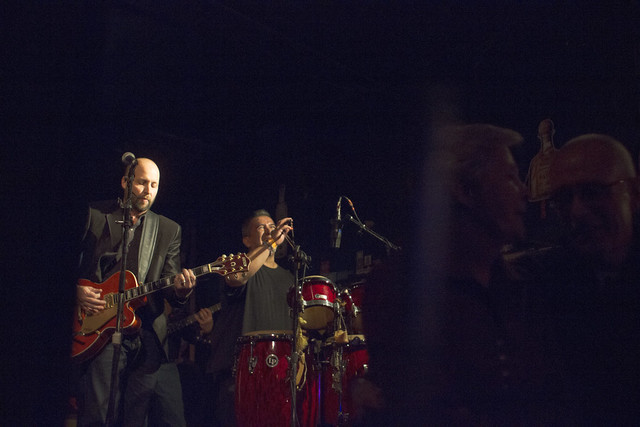
The commute from work to The Zoo Bar on Friday night must have been a short one for the tabelfuls of listeners at The Tijuana Gigolos' 5 o'clock set to kick off Lincoln Exposed's third night. Frontman Marty Steinhausen led the Latin-tinged blues band through a set of expertly played bar songs that asked its solos to take only one loop through a chord structure, then yield the floor to the next player.
Standing out from the sixteenth-note high-hat rhythms and bell of the ride preference of other songs, a most simple country rock percussion pattern led the band's cover of Dave Alvin's "Haley's Comet." With golden skulls at the foot of his congas, Tony Meza sang with a twang that told the story of Bill Haley of the 1950s band that popularized rock 'n' roll with "Rock Around the Clock." As Haley, many years past his prime, tried to convince a waitress that he wasn't "just another tired man," the tune details his lonely death, though the music belies that desolation with a chugging radiance that hearkens back to Haley's own songs.
Josh Hoyer took a saxophone solo that fit well within the confines of the song's three chords, showcasing his ability to deftly move from style to style, and from band to band, this being the fourth he'd played with at the festival.
Floating Opera at Duffy's Tavern
review and photo by Michael Todd
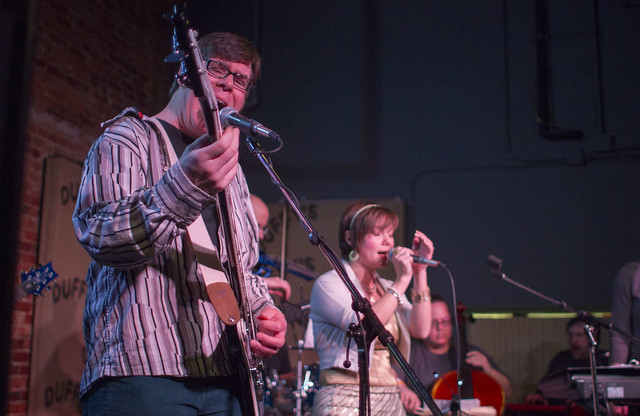
The titles of Floating Opera songs go a long way to describing the longtime Lincoln band's chamber pop, telling somewhat mythical stories through the many instruments and voices of musicians such as original member and guitarist Scott Stanfield and bassist Tery Daly.
There's titles like "Palookaville Moan" from the band's album Burning Lighthouse, and there's others like "The Car That Died of Shame," which the band said was off a forthcoming album. These songs all come from the mind of keyboard player and University of Nebraska-Lincoln mathematics professor Richard Rebarber. Lines like, "They say that every snowflake is different, but I never got close enough to tell" contrasted with an "ay-oo" sort of tribal call toward the end.
This was the third band I'd counted with binders of music on hand, testament to the complexity of chords and the fearlessness with which a handful of Nebraska bands dive into rich and slowly unfolding story structures in song form.
Blue Sky Angel Parade at The Bourbon
review by Michael Todd | photo by Cameron Bruegger
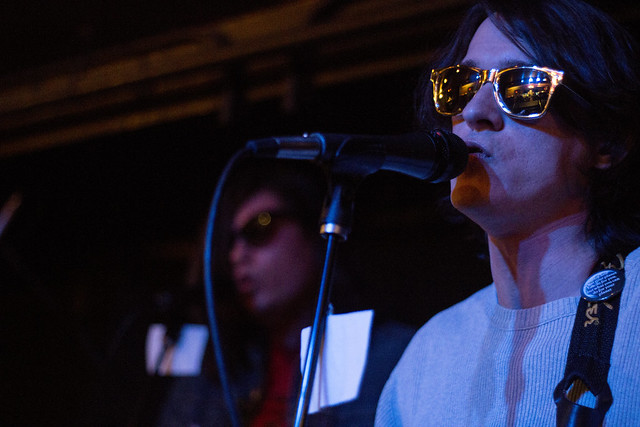
If you don't know what a Leslie speaker sounds like, listen to Blue Sky Angel Parade's frontman Phil Williams as he sings. The sort of in-and-out, psychedelic sound that's both imaginative and wobbly lives in his affected voice, which was particularly strong on Friday night at The Bourbon.
Who knows what he and bassist Colby Woodson saw through dark sunglasses, but with surfy songs searching for the edges of the universe, the images they evoked were something of a bright, shifting landscape of colors. The 13-song set played favorites with female characters as it namedropped Heather, Ms. Madonna, "April, Christie, Mary and Jane," and ended with "She Wore Jackie Ohhs," among other three-minutes-or-less avant-pop tunes.
Concise in their writing but expanding stretched-out syllables, Blue Sky Angel Parade made sense on Friday night as a trip spent smiling at the end of the world.
Evan Bartels and the Stoney Lonesomes at Parrish Studios
review by Michael Todd | photo by Cameron Bruegger
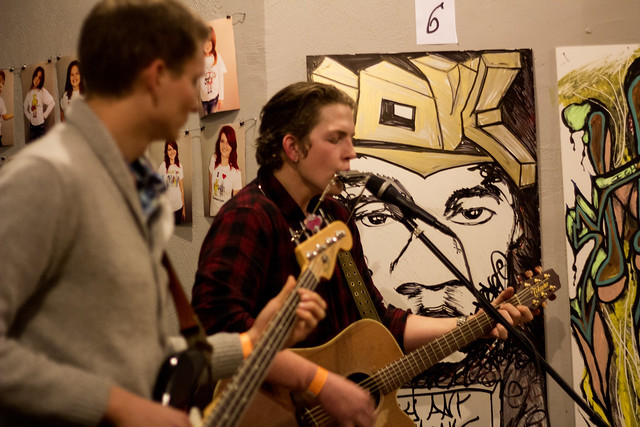
Evan Bartels and his three-piece Nebraska Americana band competed with the music through the floor from Duffy's Tavern and the music down the hall from First Friday. But through the slight din, this is the discovery of the festival for me. Think Ryan Adams circa Heartbreaker for reference to Bartels' colorful storytelling from a voice beyond his years: There's some 10 or 20 years of experience existing in his articulation that hasn't actually been lived, but somehow seems to reveal an old soul.
His guitar shows the sort of aged quality, too, with his picking turning the body just below his strings a shade lighter, like the face of an old dog. Songs like "Omaha" and "El Dorado," despite their more metropolis-bound names, musically point more toward Bartels' hometown of Tobias, Neb., than the O Street bars he's come to know since moving to Lincoln. There's a space surrounding these songs, and in the song of the set, "I Ain't The Kind," Bartels fills every square inch of that space with soul, or as he says, "honest music from a hardworking man telling his story one song at a time."
Dr. John Walker at The Zoo Bar
review by Chance Solem-Pfeifer | photo by Cameron Bruegger
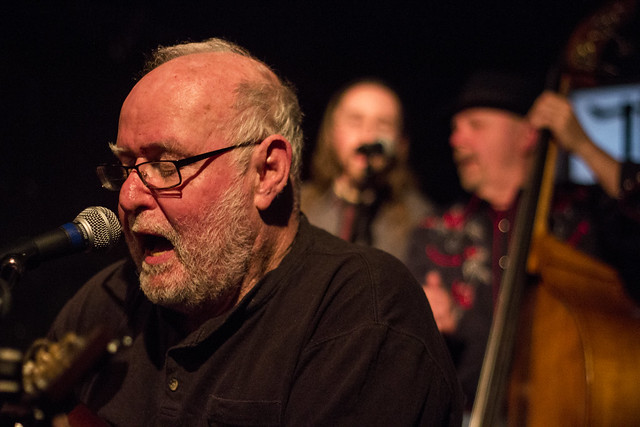
I’ve never seen a musician teach an audience genre like a parent teaches their toddler farm animals.
Right before he sings “Child of God” with his four-piece folk band, Dr. John Walker plays a bit instructional trickery on the crowd.
“In gospel music, they say ‘Lawdy, Lawdy’ and in blues music they say ‘Baby, Baby.’”
Thinking the roots rock bit will assuredly play the latter, they don’t, and instead turn toward the gospel hymn, perhaps best known from a rendition by 1950s-era crooner Bobby Darin.
And lo it went: “If anybody asks you who I am, who I am … tell ‘em I’m a child of God.”
It’s not a Christian set from Walker, so much as well-schooled one in its own tradition. Just moments before, the longtime Nebraska Wesleyan philosophy professor also used his steel finger picks on “In The Jailhouse Now.” But it was a spiritual message, an integral part of the broader culture that’s defined Walker’s folk art. And it landed a bit like Llewyn Davis, if the film figure were alive and performing in 2014.
But why the bit about “Lawdy” and “Baby”? There seemed to be some juxtaposition happening, an implication that perhaps the two might be opposite sides of the same musical coin.
“Lawdy” and “Baby,” for blues and gospel, are both expressions of some other being, both expressions of something bigger, something probably unattainable. Both are fetischized by some, cherished by others. Both are wrapped deep in American music that calls to a place and state of being beyond the singer and beyond the four walls of the room in which he or she sits.
Then Walker sang a line to the song that Google wouldn’t ever turn up after the fact, that rings like the moral of all music: “If anybody asks you where I’m bound … tell ‘em I’m on love’s journey.”
Mike Dowty Band at Duffy's Tavern
review and photo by Michael Todd
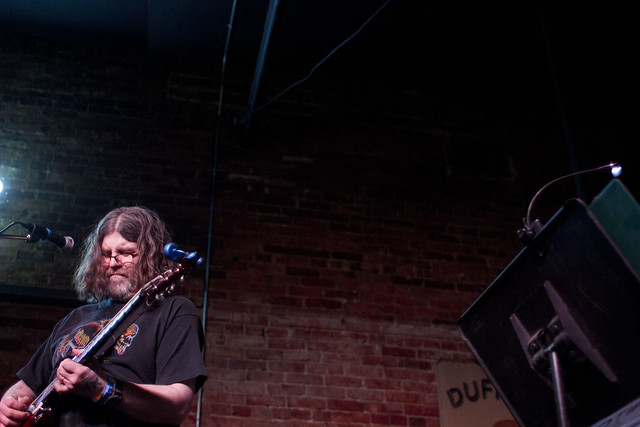
The eclectic Americana, jam-prone set by the Mike Dowty Band presented Duffy's Tavern with a hearty helping of fish and string cheese. Or you know, their musical counterparts: Phish and The String Cheese Incident.
A tapestry of organ and precise percussion reinforced Dowty's travels across his fretboard, as he performed a seven-song set that preferred to extend pieces past five minutes where possible. But let's not pinpoint this four-piece so sturdily to those jam-band cornerstones.
Fifth song "New Subsequency Drivin' Blues" seamlessly switches from a toe-tappin' opening that features a pair of voices chromatically walking up the staff to a hips-swayin', bluesy riff. And by two and a half minutes in, the clouds break for a brief walk down the boulevard, colored by Dowty's fleet fingers, sliding and bending his way through a thoroughly fun evening set.
Thanks to the band, you can hear the full live set here.
Sputnik Kaputnik at The Boubon
review by Chance Solem-Pfeifer | photo by Rhett Muller
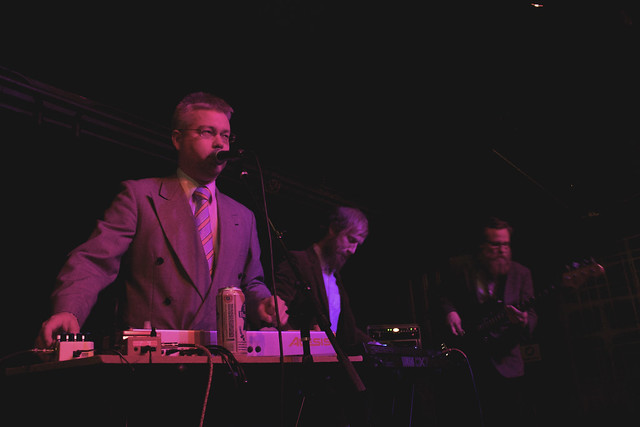
Sputnik Kaputnik are connoisseurs of weird.
On Saturday, the four-piece made Lincoln listeners follow them deeper and deeper down the rabbit hole of their character-driven new age music.
Imagine for a moment if Sputnik Kaputnik couldn’t play their instruments or refused to play them well or positioned their Russian spaceman gag too far out front of their work. A low standard suddenly becomes commonplace. There’s nothing too weird about a bad gimmick.
But quite the opposite. They crystallize the bizzaro nature of their concept inside a captivating musical package.
With Sputnik (aka Justin Firestone) and Yorden Planck (aka Josh Miller) each manning ambient keyboards, there’s something both childish and harrowing about the way they played a new song (but it’s “about old things,” Firestone offers) called “Cold Beer at Warm Prices.”
It’s a song that indicates they know something slow and sad about consumerism, like a commercial jingle launched out into a black hole by Miller’s space-funk keyboard riff and drummer Bangor Klimt (aka Peter Kapinos) rap-tapping on resonant drum pads. It’s something like a PBR dirge, and if an artist with similar sensibility like Jim James (lately, anyway) seems to be floating in the cosmos, Sputnik sounds mournfully lost in the same stars.
And that’s what makes Sputnik Kaputnik a new kind of accredited ridiculous. You don’t even know what to make of yourself when one moment, the whole aura grieves you like a detached astronaut sinking into nothing, and the next Firestone is bellowing about the beer: “There’s just one can left … let’s have it three ways / let’s have a three-way.”
That’s weird.
Dean The Bible at Parrish Studios
review and photo by Michael Todd
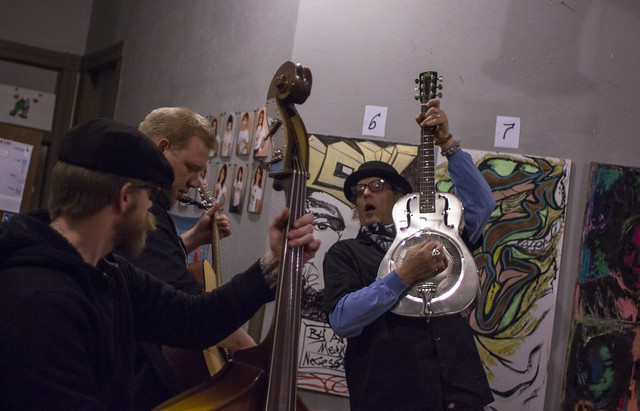
Coloring books at their feet and rousing country-outlaw songs on their set list, Dean the Bible is the kind of band you'd want to dance to with your newborn. It's simple fun, made all the more inviting by frontman Dan Dobbs' closed-eyes smile.
But if you're listening closely, Dean the Bible isn't music you'd want to have around your children who understand words. Crystal meth and fingers in the mail populate these darkly humorous songs kept in rhythm by David Rabe's suitcase drum and Jared Alberico's resonator guitar, which he'd often point to the sky.
Don't mistake Dean the Bible's irreverence for unpreparedness, though. Three-quarters of the band wore official uniforms of sorts, a black hoodie and collared shirts inscribed with "Dean the Bible," and bassist Brian Piontek paid tribute to Bolzen Beer Band, a fellow Nebraska band with a love for irreverent takes on traditional music.
This here is a stalwart Lincoln band bent on twisted stories that if you're lucky are still available at Recycled Sounds in the form of those coloring books, which come with a CD.
Sandy Creek Bluegrass at The Zoo Bar
photo by Rhett Muller
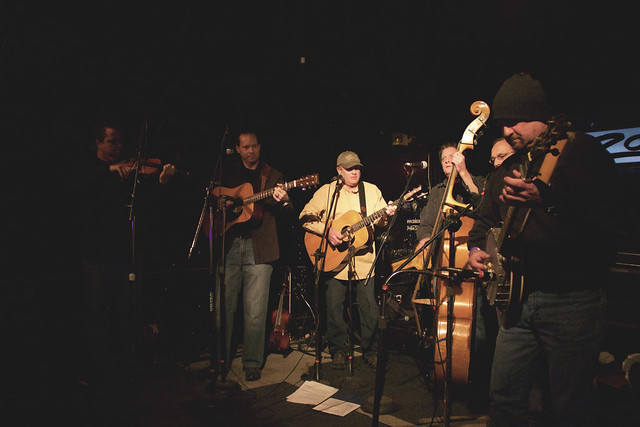
Red Cities at Duffy's Tavern
review and photo by Michael Todd
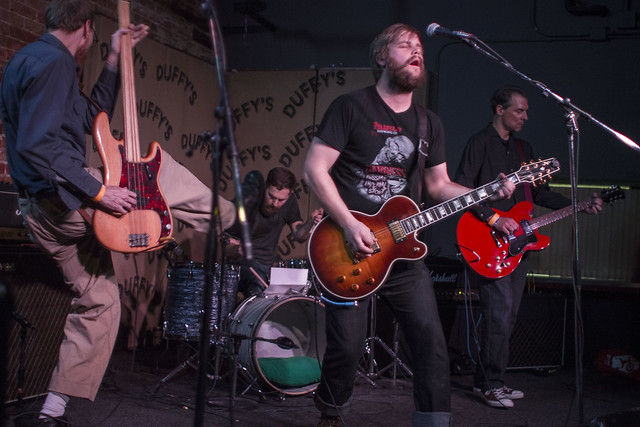
Despite their spectacular playing and laundry list of past bands, Red Cities' bassist Eric Aspengren and guitarist Matt Bokovoy have sometimes seemed to be a bit reserved onstage in the past. It's a sort of stationary noisemaking that doesn't quite mirror the goes-to-11 rock this 1-year-old band can fill a building with.
Not the case on Friday at Duffy's Tavern. Aspengren kicked and Bokovoy jumped exuberantly as vocalist and guitarist Byron Anway did his best in trying to convince the crowd that, yes, you can take a pair of the dozens of earplugs placed here as an offering to you.
Even from behind the soundman in a booth, the garage rock threatened damage to unprotected ear drums, and even that far back, you could see Anway's raised eyebrows building onto songs from the four-piece's June 2013 EP with more bone-shaking rockers that need to be recorded soon.
Root Marm Chicken Farm Jug Band at Parrish Studios
review by Chance Solem-Pfeifer | photo by Rhett Muller

No maestro would ever say Parrish Studios has good acoustics.
With unfinished floorboards — that on a February night with snow trapsed onto them — that seemed to grow soft and soggy, a maze of hallways and exposed ventilation pipes, you’d think most classically trained artists would avoid playing in Parrish’s main gathering area (just to the south of the 14th Street staircase) for anything.
Unless your band thrives on ramshackle. Unless your band is pretty much made of 20th century flotsam: beat-up suitcases, washtubs and jugs. The soggy catacombs of Parrish were made for Root Marm Chicken Farm Jug Band.
They’re a fluid cast of characters with Ian Egenberger (vocals, guitar), Josh Kornbluh (“snuffledinkle,” basically a suitcase kickdrum) and Kyle Bruggeman (jug) at the core, joined on Friday night by regulars and semi-regulars Matt Wynn (banjo), Margot Erlandson (guest vocals), Regan Kessler (washboard, tap dancing) and Brian Piontek (washtub bass).
Root Marm started out in a sound battle with the roar of Red Cities playing below at Duffy’s Tavern, but completely took over the Parrish space by doing what jug bands have done for more than 100 years in the United States: performing vigorously on the fly and under any circumstance.
Each tapping foot, whether in the band or from the crowd, became a piece of audible percussion. When his guitar plucking was difficult to hear, Egenberger turned the instrument vertically and soloed into his vocal mic and Margot Erlandson won the day with her beat-down-the-door blues vocals.
Gabe Nelson With Pants
review and photo by Michael Todd

For a band priding itself on a pair of pants, the holey jeans of frontman Gabe Nelson, bassist Torrey Rasfeld and guitarist Travis Hagge seemed to indicate this isn't a band focused on appearances.
It's one focused on a good time, told through the bouncingly rising and falling bassline of "Circle of Fools," the wistful, summery and steady drive of "Whiskey Queen," which Nelson says he wrote about Nebraska while living in San Diego. A brimming and beaming audience received the country, blues and rock tunes with their near-full attention and applause.
And true to the timelessness of the solo-ready, roots songs Gabe Nelson and the Pants played, this is music you could find just as easily in your dad's record collection as it is music that deserves its place in the contemporary Nebraska scene.
Demos at The Zoo Bar
review by Chance Solem-Pfeifer | photo by Rhett Muller
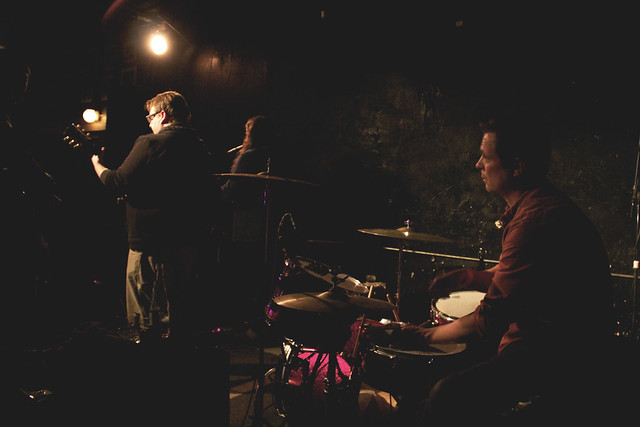
Left deprived of a set from The Renfields at Lincoln Exposed 2014, I was elated when guitarist Jarek Olivetti turned up in Demos at The Zoo Bar.
Normally a band’s regular lineup wouldn’t be a surprise, but Demos (by singer/guitarist Cory Kibler’s count) has only played four shows in three years. In describing the band’s infrequent live performances, Kibler effacingly cited some bad luck.
“We were recording a record and then [drummer] Greg’s [Joyce] computer died,” Kibler said. “So you should thank him after the show.”
Demos came across heavier and maybe a little more assured than Kibler’s other project, The Sleepover, and it seems like Olivetti had two hands in that. While The Renfields often asks the ultimate note-for-note clarity of his electric guitar, Demos found Olivetti playing coarser and fuzzier around Kibler’s sparse lyrical work, as well as exercising a commanding hard rock voice.
And while the self-deprecating remarks and the lack of stagetime don’t indicate a band with any haste to make a dent in the scene, one of the small pleasures of Lincoln Exposed has always been bands like Demos. No branding, no merch, No Facebook page; just a group of well-qualified scenesters and character actors who’d rather play loud and enthusiastically once a year than get tired of saying their own name.
Less Talk More Polka at Parrish Studios
review and photo by Michael Todd
You know you’re in for a hefty dose of polka when you need a couple extra helpers to hold the two pages of sheet music that don’t fit on the stand.
As the last of four acts to play Parrish Studios on First Friday and compete with Duffy’s music through the floors, Less Talk More Polka crammed three trumpets, a trombone, two clarinets, a tuba and a saxophone into the corner by Ben Jones’ paintings. The band — including trumpeter Frank Stroup, who played with Dear Herman and sat in with The Jazzocracy — blew their horns and reeds through standard Czech polka tunes, and sang the Bolzen Beer Band-favorite chorus, “In heaven there is no beer / that’s why we drink it here.”
What a great break from the guitar-driven format of much of the festival.
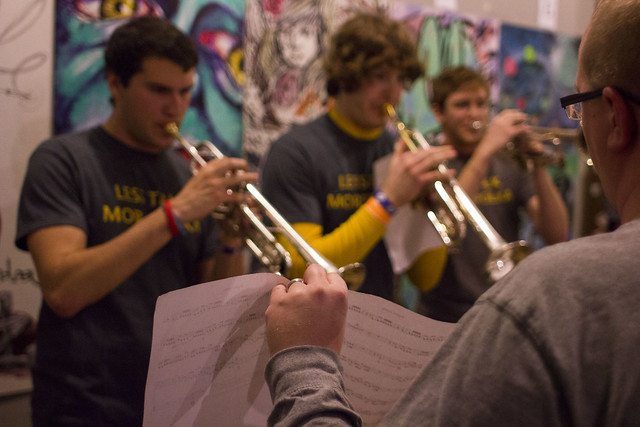
Gerardo Meza at Duffy's Tavern
review and photo by Michael Todd
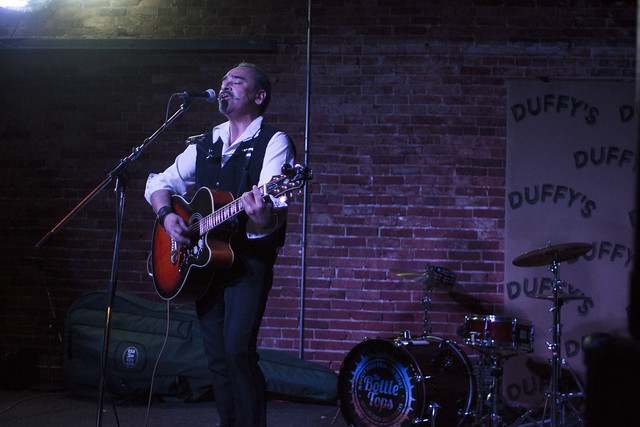
The death of Philip Seymour Hoffman reminded me just how precisely subtle facial expressions can define a person. From his pursed Capote lips to his The Talented Mr. Ripley bared teeth in a pink-drunk face, Hoffman built a career on the smallest of details.
So when Gerardo Meza sang songs of a country poet — the wayward traveler you find on a small town's barstool telling matter-of-fact tales of the road — his gaze didn't land anywhere in particular. It floated out the door to meet his songs' storytellers on some dusty county road.
Compare that with his locked-in, 120-mph look with The Mezcal Brothers, and it's no wonder newcomers to Meza's solo work might hear very little in common with the longtime rockabilly band. He's playing a different part.
The bartenders shoveling ice into buckets were the percussionists for tunes like "More Time To Kill," which Meza played with more lungs on harmonica and vocals, though he was fighting a dry throat that added gravel to those dusty roads. If anything defines a solo Gerardo Meza set, it's that he doesn't ask for attention. He'll talk to the crowd closer to the stage as if he's cupping his hand over his mouth, and he'll say, "Tell those folks by the bar to be quiet," but he's only kidding. If even one glance at this Lincoln music stronghold doesn't grab your attention, that's your loss.
Jack Hotel at The Bourbon
review by Chance Solem-Pfeifer | photo by Cameron Bruegger
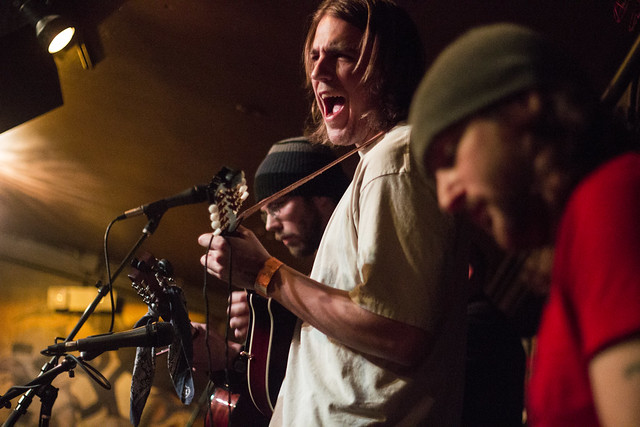
General rule of the trade: If your band is getting tipped by the audience during soundcheck, things are probably about to go pretty well.
Joining Jack Hotel at The Bourbon on Friday, Casey Hollingsworth (Bud Heavy and the High Lifes) was just warming up his mandolin when an appreciative patron sloughed a couple singles off a stack and laid them at the musician’s beat-up Chucks.
And then the Lincoln folk band succeeded in roping in the packed house at The Bourbon (the first set of the festival you said to yourself, “Oh, wow, it’s Friday night of Lincoln Exposed, isn’t it?”), and they did it at the intersection of band intelligence and songwriter Günter Voelker’s literary roves.
The latter was on display immediately when Voelker strummed the volcanic, opening minor chord of “Tobias,” a song that turns on the story of a would-be robber on the lam. Tobias (in Voelker’s smooth folk voice) tells the entire story of needing his meth fix, maybe or maybe not killing a gas station clerk and then going into hiding over it, before Voelker reminds you it’s not a linear ballad, not an Americana documentary, but an artist’s hand at play.
“This is my confession, but it also is my plea…” Tobias declares, presumably now in the present of the song’s universe, almost talking to The Rye Room. You wouldn’t blame the audience if they sat inside their heads for the rest of the set trying to negotiate what sort of man Tobias is. Or better yet, what kind of man created him.
As for the whole band of Joe Salvati (dobro), Marty Steinhausen (upright bass), Josh Rector (fiddle) and joined by Hollingsworth, Jack Hotel is just a little (and beneficially) withholding. Most songs are three minutes and none pass five. There’s an endlessness to the texture of these songs when the instruments aren’t always used for beauty. Even if none of us ever “ooo, ooo!” raise our hands like eager school children and say we’ve solved the equation of Voelker’s songs, the instrumentalists of Jack Hotel understand enough about them to reverently serve their tone.
A swoop of Rector’s bow adds another singing voice, but if he presses harder there’s a subtle and appropriate grating to these songs about characters nearing the end of their lines. Same goes for Salvati’s dobro if he slides up the neck with the right pressure. The breakdowns and solos are almost startling when they come, never lasting long enough for a “we get it already, you’re good” moment, always leaving you wanting just one more. And that’s what the next show is for.
Bonehart Flannigan at The Zoo Bar
review and photo by Michael Todd
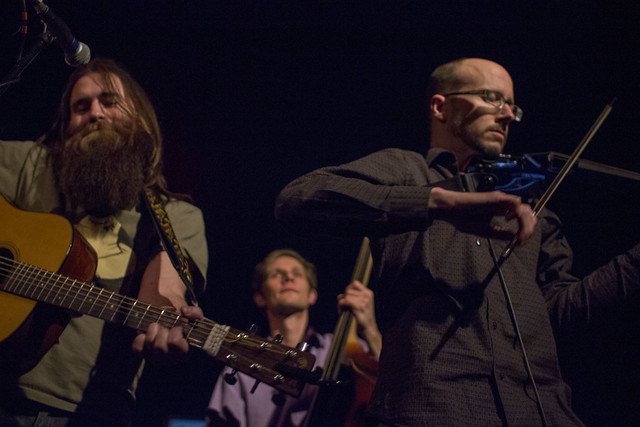
All right, Jon Dell. We'll forgive you for being a few too many drinks deep. As one of the organizers of Lincoln Exposed, Dell told the Zoo Bar crowd on Friday that he figured if he scheduled his own Bonehart Flannigan to play at 10, he wouldn't be too drunk to play.
"But no, I'm fucked up, so you guys are gonna have to deal with that," Dell said with a laugh.
Although the tone of his voice stumbled a bit, he didn't seem to lose track of any words, and true to form, the banter in between songs proved to be entertaining in its own right. With a hometown show in Beatrice the next day, he said he'd received a handful of emails in the past couple days asking why his "Locust Road Lament" didn't play more closely to his hometown's street names.
"'Lilac Road Lament' sounds fucking stupid," he explained.
Hidden behind Dell's somewhat slurred lilt is a sharp songwriter's mind, telling the story of "a town with nothing to do," a line cook who "crushes his pain and shoves it straight up his nose." And while upright bassist Mark Wolberg matched the looseness of Bonehart Flannigan onstage, he showcased his professional versatility by honing his playing for The Bottle Tops less than an hour after Dell's band finished its set.
Here's looking at Bonehart Flannigan's forthcoming album, which can be previewed here.
Bud Heavy and the High Lifes at Duffy's Tavern
review by Chance Solem-Pfeifer | photo by Cahner Olson (courtesy of The Daily Nebraskan)

You could say Bud Heavy and the High Lifes’ rendition of the old timey “Sail Away, Ladies” is in the third gear.
You could. Maybe fourth. The rest of the set is easier; it’s all in fifth.
It’s a sprint to the finish, something like a relay where all five runners are clinging to the baton at the same time. The bluegrass band pulls their wagon on all acoustic instrumentation (mandolin, banjo, fiddle, acoustic guitar and upright bass), but also on the contrast between the nasal lilt of Casey Hollingsworth and punk-hardened cries of Max Morrissey, which all stews in a chorus when the five players all lean into one vocal microphone.
Like a piece of manic Okie jazz, the songs are solo dominant with Morrissey actually yelling out the name of the instrument that’s about to fly off the rails right before it does. Here comes Emma Nelson on fiddle. Here’s Kenny Kinlund on upright bass. Here’s Jeremy Wurst on guitar. With one exception to the breakneck speed — a brilliant slow-motion breakdown in “Old Plank Road,” that felt like a Scorsese-orchestrated quaalude trip — silence could be eerie by contrast to the clatter of strings.
When the band simultaneously raised their hands on the gut-punching last note of “Night Train to Memphis,” the crowd demanded an encore. Like really demanded. Bonus songs are rare at a tightly scheduled Lincoln Exposed, and Bud Heavy didn’t come off as overeager to give one. After some discussion, some sign language with the soundman and a little hyperventilating, they rolled out “C.C. Rider,” squeezing a last bit of churning soul out of stretched larynxes.
And while it understandably didn’t seem as prepared as the rest of the set, they pulled out one hidden gadget. Hollingsworth played a pitch perfect hand trumpet, while Morrissey, delighting in the crowd response, feigned a quick catnap on his bandmate’s shoulder.
Life is Cool at The Bourbon
review by Michael Todd | photo by Cameron Bruegger
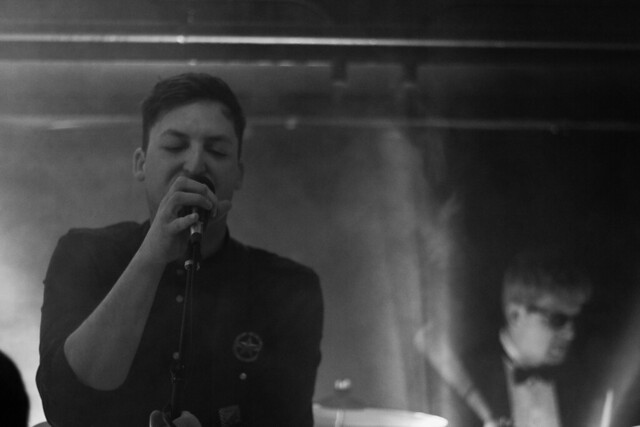
The next time you see Life is Cool, do yourself a favor and place your ears close to guitarist Eric Bemberger.
With one of his Telecasters slung high and tight, Bemberger strikes at strings near their end at the tuning keys, a sort of glass-breaking sound that punctuates the soulful music with wickedness. He'll send waves of low, droning notes that sound like the deep organ of The Shining theme and tap his strings with a perpendicular pick, creating anhydrous sorts of sounds, seemingly not of this world. And all the while, he wears a sly grin as he chops at his guitar almost murderously. It's just one fractured angle of the broken disco ball that is Life is Cool.
Led by singer, guitarist and songwriter Jim Reilly, Life is Cool circa February 2014 played a confident, smoke-filled set that pulsed through songs like "Tiny Town" and "Just Do What You Do." If I could have asked for anything, it would have been a few more hits at the end of that closer, which could go on and on with false endings. But at a festival, you have to appreciate the conciseness and respect for the next band on the schedule, too.
Dylan Bloom Band at The Zoo Bar
review by Jacob Zlomke | photo by Adam Warner (courtesy of The Daily Nebraskan)

Lincoln Exposed’s success hinges largely on its name. How many people were exposed to something new? It’s a banal turn of phrase, heard at least once from each stage every night, but there’s an importance to it.
Arguably, there is a handful of bands that regularly make the downtown Duffy’s-Zoo Bar-Bourbon-(and more recently) Vega-circuit. These are names any avid local music fan will recognize: Universe Contest, Dirty Talker, Halfwit, Mezcal Brothers, A Ferocious Jungle Cat, Josh Hoyer. The list could go on, and barring Universe Contest (whose bassist Jon Dell played with his band Bonehart Flannigan), each aforementioned act did make a Lincoln Exposed appearance.
At the Zoo Bar on Friday night, when Dylan Bloom took the stage with his contemporary country band, in between Bonehart Flannigan and Mezcal Brothers, the crowd was a blend of ostensibly longtime Bloom fans and denizens of that downtown circuit. Who was being exposed to whom? Was it Bloom’s fans to Bonehart Flannigan and Mezcal Brothers or Lincoln Exposed’s regular crowd to Bloom? Does it matter? Probably not, only that Exposed successfully connected the familiar with the non.
None of this is to treat Bloom and company like some kind of newcomers. Their schedule alone speaks to their experience: Before Exposed they played three shows in three days at the Slowdown with Emmett Bower Band, Coyote Willy’s in Lincoln and Sculley’s Shooters with JB and the Moonshine Band. The night before, they opened for Randy Rogers Band at The Bourbon (not part of Exposed), and the night after they played a sold-out show in Manhattan, Kansas, with the Wareham and Josh Abbott.
“Strong in a Small Town,” a song from early in the band’s set and the title of their recent album, finds the group with a fully-realized sound, a strong example of pop-oriented, radio-friendly country, stripped of all the pretensions and affectations often associated with country all-stars like Big and Rich.
Bloom’s twanging voice and Jason Ferguson’s blues guitar make for an earnest anthem for the folks of small, decaying towns, where people work hard and “don’t give up without a fight.” With references to “what grandpa used to say,” the track is ripe with a summertime nostalgia similar to the sentiment of Kid Rock’s “All Summer Long,” without the disingenuity and uninspired lyrical and instrumental work. Bloom isn’t pandering, he knows the town he’s singing about, and it really is his grandfather that worked the land with his bare hands for years.
It’s not a song you’d hear on a Sunday or Wednesday night at Duffy’s. But it resonates with Bloom’s army of fans, and hopefully for them with their Friday night’s circumstantial crowd as well.
The Bottle Tops at Duffy's Tavern
review and photo by Michael Todd
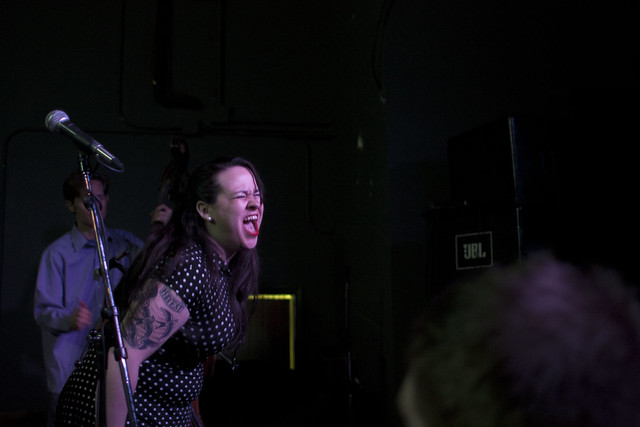
Fact: Kerry Semrad plays the PBR can better than anyone in the world.
Holding it up triumphantly, cheersing the front row of a packed room and waving it right to left and back again, she plays a more fun, more rowdy June Carter Cash to husband Mike Semrad's Johnny. And true to the bluegrass rock band's work ethic and engaging personality, just one year of difference between this year's Lincoln Exposed set and last year's — also at Duffy's — goes to show what one band can accomplish in one year, growing a devoted audience that will soon see the release of an album at The Pla Mor Ballroom on March 8.
Concertgoers with all colors of hair, from deep black to white, bobbed up and down, jigged left and right as The Bottle Tops played through barn-burning-then-building-up-again favorites such as "Easy" and "The Story Goes," along with more somber song matter like that of "White Clay."
And it doesn't hurt that the Semrads are supplemented by musicians like pedal steel player Mike McCracken, whose lightning-fast picking and dexterity could slip in that characteristic middle-eastern lick of cheesy Western cinema into a country song. Now that's something Mark Wolberg can lift his upright bass over his head to.
AZP at The Bourbon
review by Chance Solem-Pfeifer | photo by Michael Todd

It can be hard to parse out the many contrasts in AZP.
In their music, the core duo of Ishma Valenti and Zachary Watkins navigates a mountain of sensitive territory. They’re revolutionaries, but still want to entertain. They’re demonstrably religious men, but they don’t want to prosthelytize. They’re pacifists, but their latest EP Early Sunday Morning is embattled with a current of fighting spirit and the tonal violence of songs like “Charge.”
It’s part of what makes pinpointing any one precise message very difficult. It’s part of what makes them fascinating.
But “Black Jesus” says it all. It wasn’t the most crowd-pleasing song during their packed Friday night set at The Bourbon. That distinction would go to older, staple AZP songs “Keep It Simple” or “I’m Laughing.” But even in the din of the crowd and the full five-member band, “Black Jesus” clarified some crucial racial messages that regularly inhabit a few verses from Valenti. But here the cover of their album, which features the evocative face of a black Jesus in the thorny crown, gets its own song.
On Friday, with Watkins tapping at a dancey, haunting bassline on piano and Valenti seemingly positioned high above the crowd, the opening of “Black Jesus” articulated in a song that can barely contain its own pent-up frustration a gross inequality of images (and, in turn, life experience) that for black children raised Christian, the most important imagistic figure in their lives is fearfully, unflinchingly white-skinned. The song gives voice to a formative problem.
Valenti rapped: “Now, they say, ‘But wait, it don’t really matter.’ Well, if it don’t matter, then why not make him blacker?”
AZP, like St. Christopher on Wednesday night, found the sweet spot between social consciousness and living a moment by simply pointing to the room they were in. With James Shehan’s guitar howling in the background, Valenti waved his hands at all the ills of the city and the country and the world, but looked AZP’s audience in the eyes and put it bluntly: “They can’t tear this apart.”
Mezcal Brothers at The Zoo Bar
review by Jacob Zlomke | photo by Cameron Bruegger

Mezcal Brothers take no time in getting to their showmanship. After over a decade of playing together and extensive touring, the band has earned the right to show off as Lincoln’s premier roots rock and rockabilly band.
And so they do. At the Zoo Bar on Friday night, frontman Gerardo Meza, who played an earlier solo set at Duffy’s, takes the stage in typical dress: slicked-back hair, carefully-waxed mustache, mostly dressed in black. His bandmates share his flair. It’d be very easy to dismiss the stage presence as costumery — part of the throwback ‘50s rock ‘n’ roll act.
When stand-up bassist Charlie Johnson rolls onto his back and plays his instrument hoisted in the air by his feet, it’s theatrical, sure. But it’s also incredibly sincere. It was only the second song, but the move is prompted entirely by the crowd’s energy: swing-dancing couples and cheering audience members.
Understandably, too. It’s hard not to swoon at the band’s charm, at Meza’s throwback dance moves, at the pure joy the band members get out of playing music with each other and for a receptive audience.
Burning Down The Villager at Duffy's Tavern
review and photo by Michael Todd

Give Grady McGuire props for even more present vocals, strong hits of high notes and a well-honed vibrato that tapers off well. These are the characteristics of a good band gone better.
Opening with “Oceans,” the locked-in first track from the band’s debut album, McGuire drove his rocking-horse guitar through the air as brother Will laid down solid tracks of lead guitar by which bassist Matt Cornell and drummer Vince Ruhl could travel.
This is a band that never seems to fall out of step with one another, always working in tandem to create almost mechanical precision. After a night of 24 bands, double the amount of Thursday night, Burning Down the Villager offered a sort of shot-in-the-arm end to the shows at Duffy’s, cementing their place in the scene only a couple years into their existence.
Bloodrail at The Bourbon
review by Jacob Zlomke | photo by Michael Todd

Playing Friday night at The Bourbon, sans bassist who, according to vocalist/keyboardist Joey Horton on stage, had “officially been fired” for not playing the show, Bloodrail persisted.
The difficulties imposed by lack of a lower-end instrument were alleviated by the progressive-metal bands presence of synthesizer, hauntingly sailing both above and below the power of Cameron Ruble and Ronald Reimers’ guitar.
“Gasoline Grunt” may be the prime example of Bloodrail’s synth-laden metal, giving equal time to all of Horton’s vocal talents, where he swings with ease from falsetto to screaming and speaking in equal turn with dueling melodic guitars.
Bloodrail closed out Lincoln Exposed’s third night, after eight consecutive hours, starting with Tijuana Gigolos at 5 p.m. at The Zoo Bar. Where, as a timeslot, the last set can be seen as an honor, to be the final impression of the day, in practical terms, it can present something of a challenge: to engage a crowd worn down after a long day.
But for Bloodrail, rising to the task was no particular challenge. Bassist or no, the group demands energy, attention from the audience.
Michael Todd is Hear Nebraska's managing editor, Chance Solem-Pfeifer is HN's staff writer, Cameron Bruegger is an HN multimedia intern, and Jacob Zlomke and Rhett Muller are HN contributors. Reach them all through Michael at michaeltodd@hearnebraska.org.




